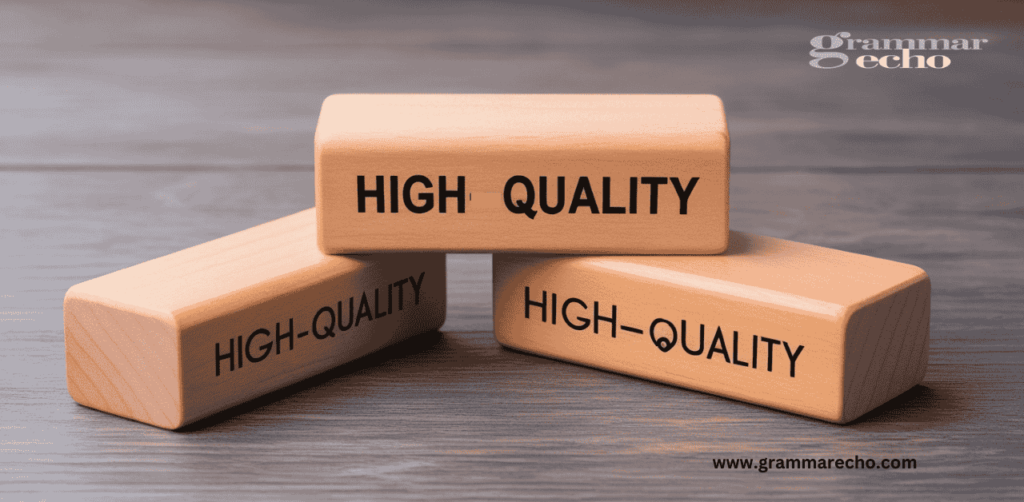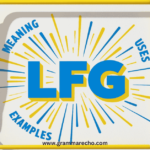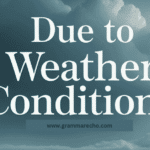The terms “high quality or high-quality” serve different purposes in writing. “High quality” is a noun phrase that describes general excellence or superior standards, used after verbs or prepositions. “High-quality” is a compound adjective with a hyphen, used before nouns to describe specific things that meet high standards.
Many writers struggle with choosing between these similar-looking terms in their daily writing. The small difference of a hyphen can greatly change how we use these words in sentences. Understanding this difference can make your writing clearer and more professional.
The correct usage depends on where the term appears in your sentence. Use “high quality” when talking about general excellence, like “This product is of high quality.” Use “high-quality” with a hyphen when describing something specific, like “This high-quality product.” This simple rule helps maintain clear and effective communication.
The Common Confusion: “high quality or high-quality”
If you’ve ever hesitated before writing “high quality” or “high-quality,” you’re not alone. This small detail often leaves even seasoned writers scratching their heads. Both forms are widely used, but their meaning and usage aren’t always clear at first glance. The confusion arises because they look almost identical yet serve different grammatical purposes in writing.
“High quality” is a noun phrase that refers to a general standard of excellence. For instance, you might say, “The craftsmanship is of high quality,” to emphasize the superior nature of something without modifying a specific noun.
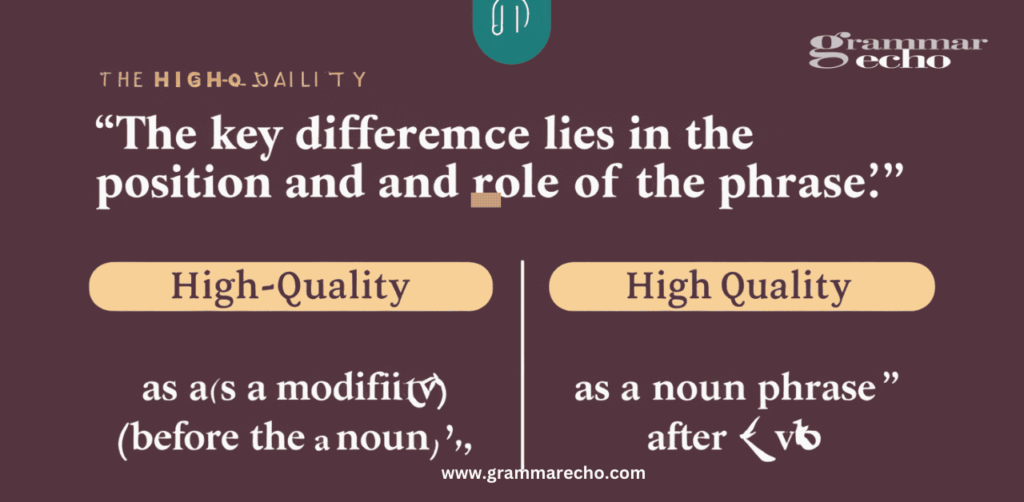
On the other hand, “high-quality” is a compound adjective. It works to describe a noun directly, such as in the phrase “high-quality materials,” where the hyphen ties the words together to create a single, precise descriptor.
Must read: “skillset or skill set”: Which is Right?
Understanding the Terms
Definition of “High Quality”
“High quality” is a noun phrase used to describe the overall excellence or superior standard of something. It focuses on the value or worth without directly modifying another word.
Example. When you say, “Their products are of high quality,” you’re highlighting the exceptional standard of the products in general. This form often appears after verbs or prepositions, such as is, of, or has.
Essentially, “high quality” emphasizes the outcome or characteristic rather than acting as an adjective. It’s commonly used when the focus is on the concept of excellence itself, making it perfect for conveying a broad, general idea of superiority.
Definition of “High-Quality”
“High-quality,” on the other hand, is a compound adjective that directly modifies a noun. It is used to specify that the noun it precedes meets a superior standard.
Example.
In “high-quality craftsmanship,” the hyphen links the words to create a single descriptive term. This form is more precise, adding clarity to your writing by specifying that the noun possesses exceptional characteristics.
The key difference lies in their roles: while “high quality” identifies excellence broadly, “high-quality” pinpoints superior attributes in a specific item or service. Using them correctly can help your writing appear more professional, concise, and grammatically accurate.
“high quality or high-quality”: Which is Correct?
Both “high quality” and “high-quality” are correct, but their usage depends entirely on a sentence’s context and grammatical role. While they appear similar, these terms serve distinct purposes that make understanding their differences essential for professional writing.
The key is understanding their grammatical roles: “high quality” is used for general references to excellence, while “high-quality” provides specificity. Using the correct form can enhance clarity and professionalism in your writing, ensuring your message resonates effectively with your audience.
Grammar and Linguistics
Analysis of the Hyphen’s Role in “High-Quality”
The hyphen in “high-quality” isn’t just a visual marker, it plays a crucial grammatical role by connecting two words into a single compound adjective. This ensures clarity by signaling the reader that the words work together to describe a noun.
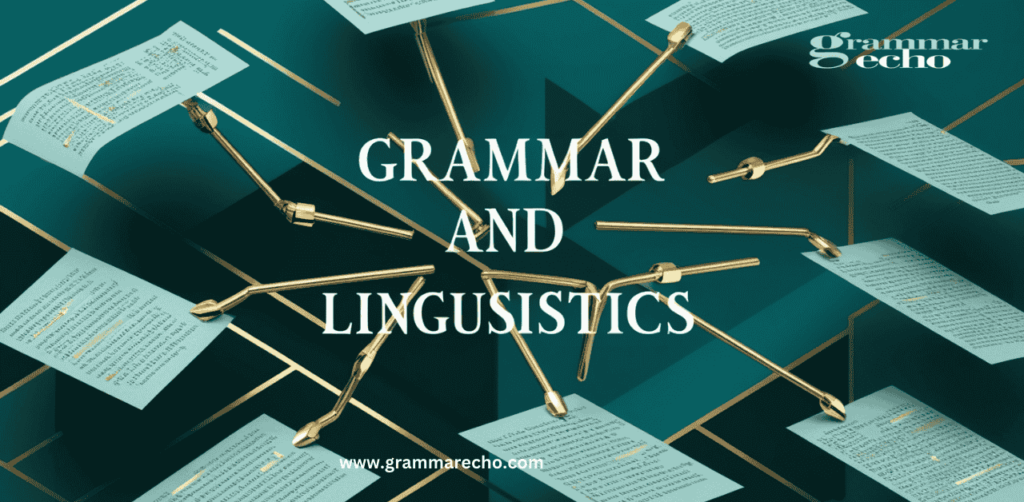
For example, in “high-quality craftsmanship,” the hyphen prevents misreading, ensuring the reader understands the entire phrase as a unified descriptor. Without the hyphen, the sentence could appear ambiguous or awkward.
Hyphens are particularly useful in professional writing, where precision is essential. They streamline sentences and eliminate confusion, creating a polished, cohesive tone that reflects attention to grammatical detail.
Explanation of Compound Words and Their Formation
Compound words are formed by combining two or more words to create a new term with a specific meaning. They can appear as open compounds (e.g., “ice cream”), closed compounds (e.g., “notebook”), or hyphenated compounds . Hyphenated compounds, like “high-quality,” are often used when two or more words act together to modify a noun.
The hyphen serves to connect these words into a single grammatical unit, preventing misinterpretation. For instance, “high-quality products” clearly conveys that the products possess superior attributes, while removing the hyphen could create a less cohesive meaning.
You will like: “Up to Date” or “Up-to-Date”: Which One Should You Use?
Alternative Words
Using synonyms for “high quality” and “high-quality” can add variety and richness to your writing while keeping the message clear and engaging. Here are some alternative words and phrases that convey similar meanings:
For “High Quality” (Noun Phrase)
- Excellence: Highlights superior standards or unmatched performance.
Example: Their dedication to excellence sets them apart in the industry. - Premium Quality: Suggests an elevated level of craftsmanship or service.
Example: This brand is known for delivering products of premium quality. - First-Rate: Implies the best possible standard or ranking.
Example: The customer service they provide is first-rate. - Superior Craftsmanship: Emphasizes outstanding skill or artistry.
Example: The superior craftsmanship of these shoes ensures durability. - Top-Notch: A casual yet effective way to describe high standards.
Example: Their top-notch performance impressed everyone.
For “High-Quality” (Compound Adjective)
- Exceptional: Highlights something that stands out due to its excellence.
Example: They offer exceptional service that exceeds expectations. - Top-Tier: Refers to the highest category or class.
Example: This top-tier product line caters to luxury consumers. - Premium: A widely recognized term for outstanding items or services.
Example: The premium materials used ensure long-lasting results. - First-Class: Conveys an unparalleled level of excellence.
Example: The first-class experience they provide is unforgettable. - Superior: Indicates something better than the rest.
Example: Their superior quality control guarantees customer satisfaction.
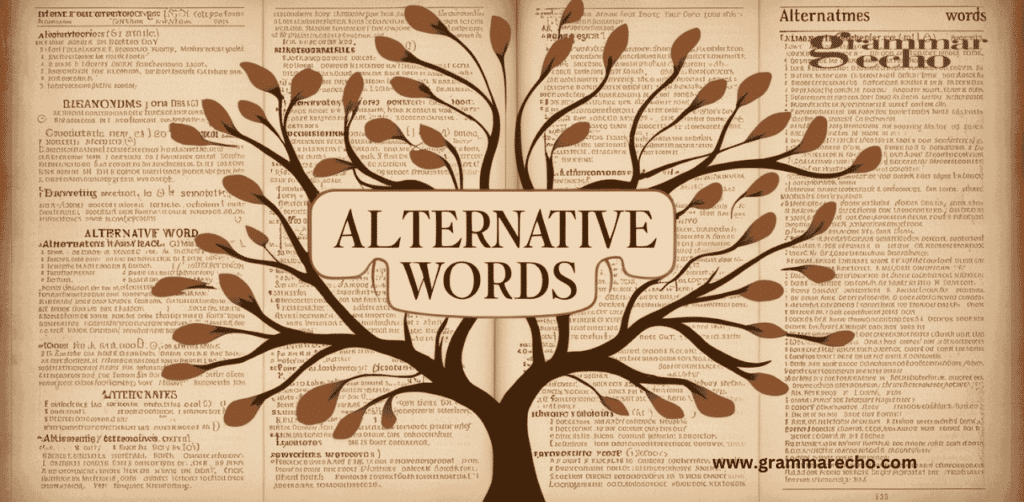
How to Use These Alternatives
Choosing the right synonym depends on the tone, audience, and context of your writing. For formal writing, options like “superior” or “premium quality” are ideal. “top-notch” or “first-rate” may be better suited in more conversational contexts.
Using varied vocabulary improves readability and keeps your writing dynamic and engaging while maintaining a professional and precise tone.
The Origin Story
Using terms like “high quality” and “high-quality” can be traced back to the evolution of English grammar and word formation. The word quality stems from the Latin term quality, introduced by the Roman philosopher Cicero to describe characteristics or attributes. Over time, “quality” represented excellence or superiority in English, particularly during the 14th century.
The hyphenated form, “high-quality,” emerged later, primarily as language adapted to describe more specific attributes. The need for precise descriptors grew in the industrial and commercial boom of the 19th and 20th centuries.
Writers and advertisers began using compound adjectives like “high-quality” to modify nouns more clearly and concisely. The hyphen was a grammatical tool to link words into a single descriptive unit, paving the way for modern usage in marketing, journalism, and professional writing.
This linguistic evolution highlights how English adapts to meet communication needs, ensuring clarity and effectiveness in various contexts.
The Impact of Correct Spelling on Readability
Choosing between “high quality or high-quality” might seem trivial, but it significantly impacts readability and comprehension. When writing, the placement of the hyphen can clarify the intended meaning, making sentences more straightforward to understand. For example:
- “This brand is known for high-quality products.” (modifies products directly)
- “The craftsmanship is of high quality.” (refers to the general standard)
Correct spelling ensures readers instantly grasp the relationship between words, reducing ambiguity. Misplacing or omitting a hyphen can lead to confusion, making sentences feel clunky or unclear. For instance, “high quality materials” might prompt readers to question if it’s the materials themselves or their standard being described.
In professional writing, precise grammar reflects attention to detail and boosts credibility. Whether crafting advertisements, academic essays, or everyday correspondence, using correct spelling and hyphenation enhances both the aesthetic and functional aspects of your writing.
Read more about: “Re-sign or Resign? Learn When and How to Use Each Correctly
Test Yourself by This Exercise
Let’s test your understanding of “high quality” and “high-quality”! This short quiz will help you recognize how to use these terms correctly in different sentences. Read the instructions carefully and choose the correct conjugation for each sentence.
1. Fill in the blank with the correct form of the phrase:
- “The furniture is of craftsmanship.”
a) high quality
b) high-quality
2. Choose the correct option to complete the sentence:
- “She was impressed with the ____ care she received at the hospital.”
a) high quality
b) high-quality
3. Which sentence correctly uses the hyphen?
- a) “They offer high quality service to their customers.”
- b) “They offer high-quality service to their customers.”
4. Select the sentence where “high-quality” should be used:
- a) “The company prides itself on delivering products of high quality.”
- b) “The company prides itself on delivering high-quality products.”
5. Fill in the blank with the proper term:
- “This brand is known for offering ____ electronics.”
a) high quality
b) high-quality
Answers:
- a) high quality
- b) high-quality
- b) “They offer high-quality service to their customers.”
- b) “The company prides itself on delivering high-quality products.”
- b) high-quality
How did you do? This quiz is a simple way to practice your understanding of the correct usage of “high quality” vs. “high-quality.” Keep these distinctions in mind to sharpen your writing skills!
Final Thoughts
Understanding the difference between “high quality or high-quality” enhances your writing. Using “high quality” as a noun phrase gives a general sense of excellence, while “high-quality” describes something specific.
Knowing when to use each term ensures clarity. It helps avoid confusion and improves the precision of your communication. Mastering these distinctions will make your content more effective and readable, whether you’re writing professionally or casually.
FAQ’s
“High quality” is not hyphenated when used as a noun phrase. It refers to the general level of excellence.
“High value” is typically not hyphenated. It’s used as a noun phrase, describing something of great worth.
Both can be used, but “high quality” is preferred when emphasizing a superior level of excellence or standard.

Lily Suzi is an experienced blogger and the voice behind Grammar Echo. With a passion for language and a knack for storytelling, she explores the nuances of grammar and writing in a relatable way. Her insights not only educate but also inspire readers to appreciate the beauty of clear communication.

